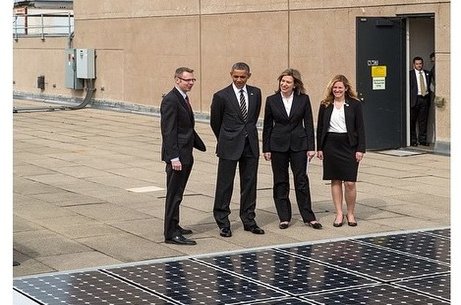
Kate Brandt has authored an executive order issued by President Obama last week which commits the US government to significantly reducing its greenhouse gas emissions.
A Gates Cambridge Alumna has authored an executive order issued by President Obama last week which commits the US government to reducing its greenhouse gas emissions by 40 percent over the next decade from 2008 levels.
According to the EO, authored by Kate Brandt, the plan will not only tackle the global climate change threat but save US taxpayers up to $18 billion in avoided energy costs as well as increasing the share of electricity the Federal Government consumes from renewable sources to 30 percent.
Complementing this effort, several major Federal suppliers, including IBM and GE, have announced commitments to cut their own GHG emissions.
The White House says that the combined results of the Federal Government actions and new supplier commitments will reduce GHG emissions by 26 million metric tons by 2025 from 2008 levels, which it says is the equivalent of taking nearly 5.5 million cars off the road for a year. The Administration has also released a new scorecard to publicly track self-reported emissions disclosure and progress for all major Federal suppliers.
Other measures outlined in the Executive Order include a commitment to:
– Ensure 25 percent of their total energy (electric and thermal) consumption is from clean energy sources by 2025.
– Reduce energy use in Federal buildings by 2.5 percent per year between 2015 and 2025.
– Reduce per-mile GHG emissions from Federal fleets by 30 percent from 2014 levels by 2025, and increase the percentage of zero emission and plug in hybrid vehicles in Federal fleets.
– Reduce water intensity in Federal buildings by 2 percent per year through 2025.
The US Federal Government is the single largest consumer of energy in the US and although it is responsible for just a small percentage of the world's greenhouse gas emissions, it hopes its actions will encourage other governments to follow suit.
Kate Brandt [2007], who did an MPhil in International Relations at the University of Cambridge with the support of a Gates Cambridge Scholarship, has been the US Government's Federal Environmental Executive since 2014. Following the publication of the Executive Order, she has also been named the US government's first ever Federal Chief Sustainability Officer.
She says: “The Gates vision of social leadership deeply impacted my decision to devote my career to public service.”
After leaving Cambridge, Kate worked at the Democratic National Convention in Denver, Colorado, and for President Obama’s 2008 campaign in the state of Florida.
Following the 2008 campaign, Kate served on the Presidential Transition Team for Dr Susan Rice and the National Security Agency Review Team. She began at the White House on the first day of President Obama’s administration as a Policy Analyst in the White House Office of Energy and Climate Change.
She then served as the Special Advisor for Energy to the Secretary of the Navy at the US Department of Defense where she was awarded the Harry S. Truman Extraordinary Impact Award.
Following her work at the Department of Defense, Kate was a Director for Energy and Environment in the Office of Presidential Personnel at the White House, recruiting, interviewing and managing the presidential appointment of Senate-confirmed and senior candidates for energy and environment federal agencies.
After the White House, Kate served as a Senior Advisor at the US Department of Energy in the Office of the Under Secretary for Science and Energy where she played a key role in establishing the office and executing President Obama’s Climate Action Plan.












